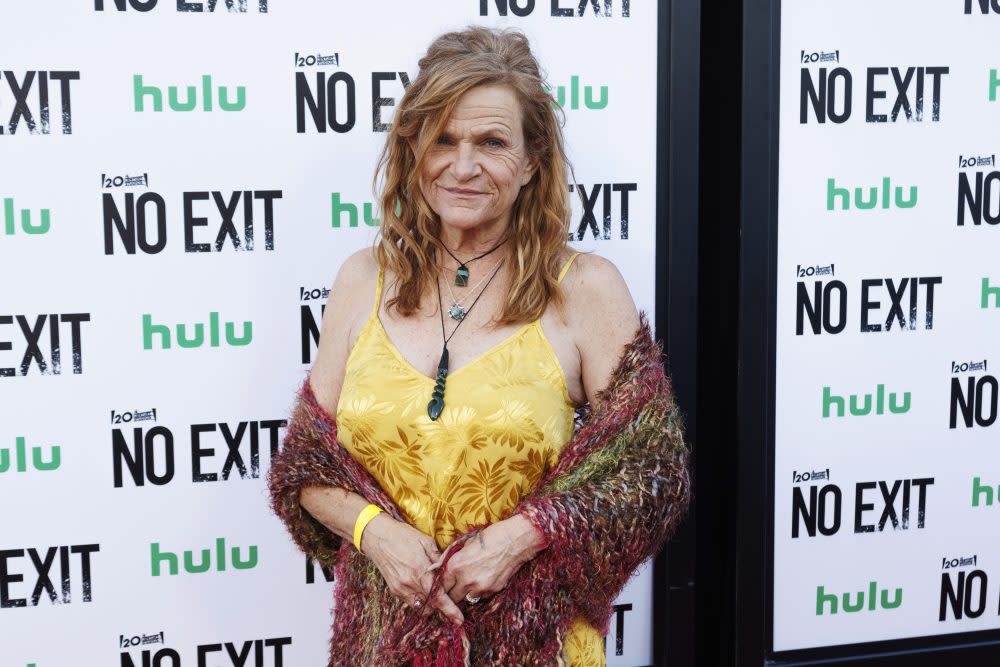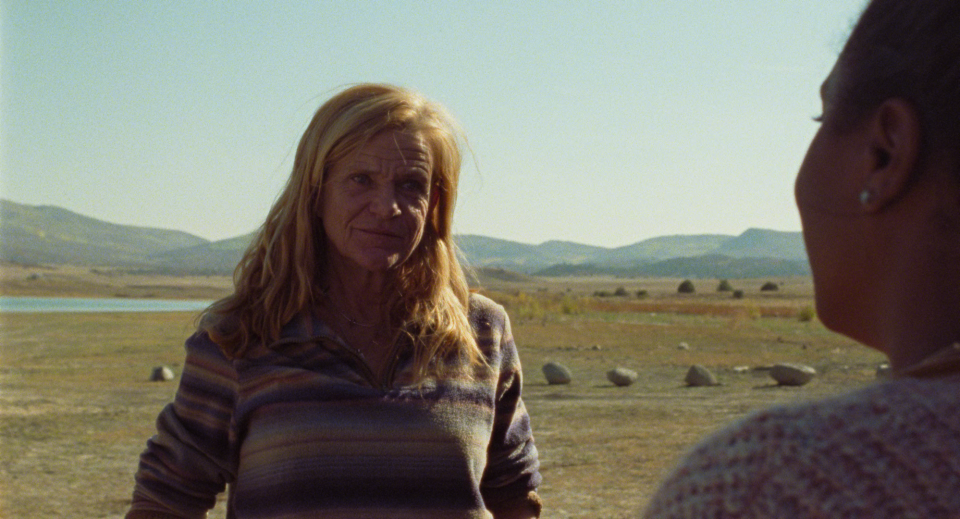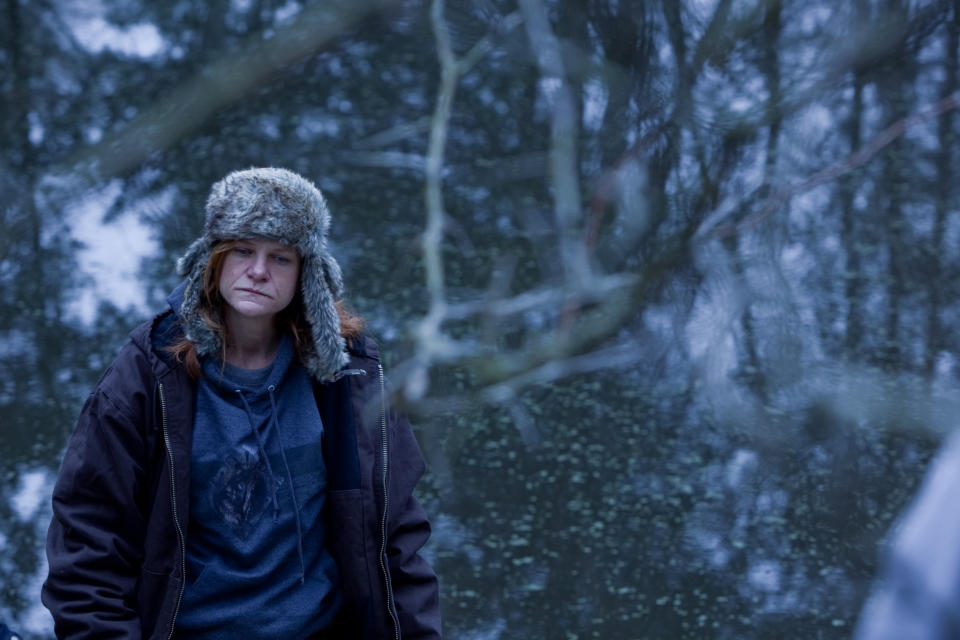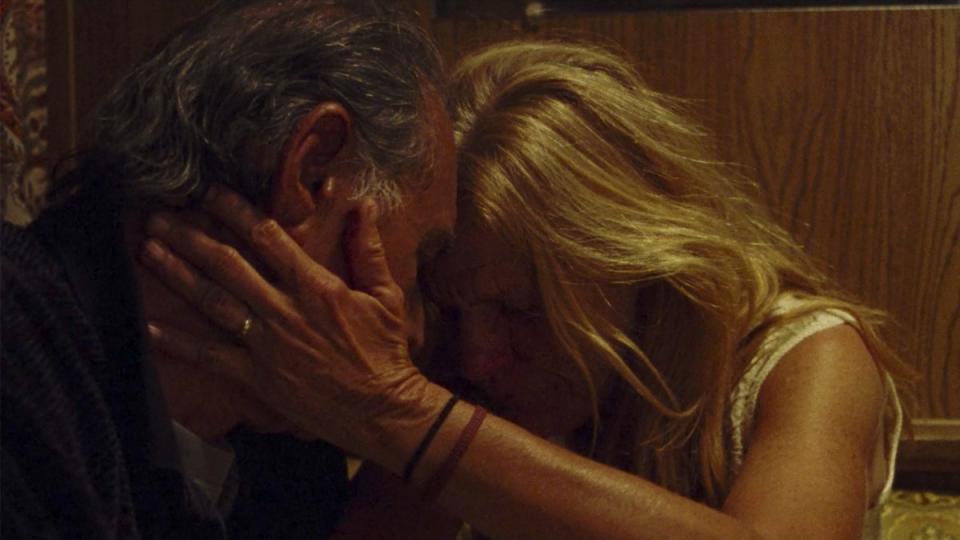After Three Decades in Hollywood, ‘A Love Song’ Finally Turned Dale Dickey Into a Leading Lady

- Oops!Something went wrong.Please try again later.
Dale Dickey is not jaded, even after nearly three decades in Hollywood. The actress’ earnest humility, infectious curiosity, and unpretentiousness when talking about her craft and decades-long career would feel refreshing from anyone, let alone someone who has been a successful working thespian in film and TV for nearly thirty years. The Indie Spirit winner has dozens of credits to her name, in projects of all genres and sizes, including “Winter’s Bone,” “Breaking Bad,” “True Blood,” and “Palm Springs.” But now she has a new one to add to the resume: leading lady.
Known for portraying memorable, hard-scrabble women, the character actress is finally breaking untraveled ground with her first on-camera lead role in the tender-hearted indie romance “A Love Song,” director Max Walker-Silverman’s debut feature, which premiered at this year’s Sundance Film Festival to stellar reviews. “I’m not complaining, but I’ve never really had the luxury of choosing projects. Maybe now I’m getting to that point,” Dickey told IndieWire during a recent interview via video call from her home in Los Angeles.
More from IndieWire
'Not Okay': How Filmmaker Quinn Shephard Sifted Through Notorious Scammers for That Influencer Cameo
With 'Not Okay,' Zoey Deutch Seals Her Status as Hollywood's Unexpected Queen of Scammers
A proud native of Knoxville, Tennessee, Dickey attributes her affinity for the performing arts to her grandparents’ dedication to taking her and her siblings to the theater throughout their childhoods. By the time she was nine years old, Dickey was already acting in plays at the University of Tennessee, an institution where she later studied as a young woman.
Post-graduation and armed with an Equity card from the Actors’ Equity Association, she headed to New York City, where she hit the pavement without representation for 12 years as she tried to establish herself in the theater scene. Labeled an “unusual type,” someone outside of the traditional beauty standards the industry still upholds, she struggled to break through for several years. “I had trouble finding agents in New York. They didn’t know what to do with me,” she said.
On her own, Dickey eventually managed to jump in front of the camera, landing a recurring role in the TV series “Christy,” a few student short films, and her first big-screen part in Maria Maggenti’s queer coming-of-age “The Incredibly True Adventure of Two Girls in Love,” which debuted at Sundance in 1995.

Bleecker Street
“I fell between the cracks. I was not pretty enough in this category to be the leading lady and I wasn’t quirky or odd enough in this category to be the only character actress,” Dickey said. “Even in college, I tended to play everybody under 12 or over fifty. I think you finally grow into your age range and, sure enough, when I started getting into my mid-forties is when I started working more. I slowly built a career, but it was difficult.”
In her early thirties, Dickey looked West. She first traveled to Los Angeles to try her luck. Soon, a theater director who had hired her on several productions over the years, and who now had a boutique agency, changed things. “I was terrified to make the move because I thought, ‘I can’t spend another 10 years without an agent,’” Dickey said. “I said, ‘If I can get an agent, I’ll move.’”
At first, the sort of parts Hollywood offered her took a toll on her self-esteem. The bulk of her work included guest starring gigs on a variety of TV shows. “It was a little difficult for about 10 years, because every [character] breakdown of the role said, ‘not necessarily attractive,’ or ‘unusually pretty,’” Dickey said. “And I was like, ‘I want to play the pretty girl.’”
With time, Dickey understood that perhaps being typecast as women with troubled existences represented a sort of job security that enabled her to grow and remain consistently employed. “I’ve got a crazy face, but it works for what I do. I’ve learned to accept it and I’ve gotten to play some wonderful roles,” she said with a laugh. “Screw vanity!”
But although she has no problem being pigeonholed in Southern roles — “That’s what bleeds from my soul” — it’s imperative to her to dignify parts that are often depicted in one-dimensional and humiliating fashion. “I want to bring humanity and dignity to everybody I play, particularly people on the fringe that are not shown that much on camera or are seen only as poor and ignorant,” she said.

For Dickey, a landmark of positive Southern representation that impacted her was Georgia-born star Holly Hunter’s turn playing Jane Craig in 1987’s “Broadcast News.” Hunter received an Academy Award nomination for her work in the James L. Brooks-directed film. “It was the first time I’d seen a leading role from an actress with a big ol’ Southern accent. It had nothing to do with her being from the South, never even came up. She was this bright, brilliant businesswoman running the news in New York,” said Dickey. “That made sense to me.”
Despite her optimistically pragmatic outlook on her life and profession, Dickey has often found herself at an existential crossroads questioning her future as an actress, but she could never give up the only path she ever wanted to pursue. “It flashed over my mind a couple of times at very low points in my life, but it just never dawned on me to quit it,” she said. “Had I not gotten positive feedback and encouragement years ago in New York when I couldn’t get an agent and I’d go to open calls or if people would have said, ‘You suck, get out of the business,’ I wouldn’t have kept going.”
It was during one of those painful periods of uncertainty after some disappointments in La La Land that she received a boost of confidence from Oscar winner Sean Penn. He enjoyed her work and cast her in his 2001 directorial effort “The Pledge,” starring Jack Nicholson. Dickey credits this opportunity as the source of inspiration that allowed her to keep going.
In the years that followed, Dickey continued to amass a string of one-episode, sometimes two-episode, jobs. One of the most notable was in the acclaimed crime drama “Breaking Bad,” as a drug user who kills her husband with an ATM machine. She humorously remembers friends calling with concern about her mental health after her episodes aired.
Right after she finished doing pickups for “Breaking Bad” in New Mexico that she auditioned for and landed the most recognized role of her career thus far in Debra Granik’s tense saga of family and honor, “Winter’s Bone,” with Jennifer Lawrence as the lead.
Dickey played Merab, a brutal matriarch unafraid to use violence in order to stand her ground against anyone she perceives as a threat to her clan’s reputation. For her deeply intimidating performance, Dickey won the Independent Spirit Award for Best Supporting Female.
Granik recalled that during the shooting of “Winter’s Bone,” Dickey had a revelation and explained that she didn’t perceive her character, Merab, as a stone-cold sadist, but that there was another layer to her that responded to Lawrence’s character Ree’s plight. Granik told IndieWire that, before this input, she had approached Merab in a rather reductive manner, and that it was Dickey’s “human barometer” to see beyond the seemingly villainous qualities that imbued the performance with more substantial complexity.
“Dale is simultaneously doing deep research into the recesses of human nature to see what else she might find, and then she would bring that to the director and offer it to the film,” Granik said. “You just cannot ask for more.”
Later that awards season, she attended the Oscars ceremony, where “Winter’s Bone” was nominated for four awards, including Best Picture. Her most persistent memory of that night is the shock on Geoffrey Rush’s face upon learning that she played Merab. Dickey, dressed up for the occasion, didn’t resemble her character.
As more projects come her way, Dickey has become far more selective, and for a multitude of reasons. “I’m in it for the long haul. I grew up in a very chaotic, dysfunctional, loving home, there’s something in my makeup I can deal with the ups and downs and insecurity,” she said. “But as I get older, it gets a little harder because the ups and downs with not knowing when your next job is coming affects everyone in your life. But I love it and I try to make the best of it.”

Bleecker Street
Unaccustomed to having top-billing on a production, “A Love Song” represented the rare of opportunity for Dickey not only to be centerstage, but to do so playing a character unlike those she has often been recognized for. As Faye, she transforms into a woman patiently waiting at a campground to reconnect with a classmate she hasn’t seen in decades.
“Dale often jokes, ‘It’s been a real natural thing for people to cast me with a beer and a shotgun,” said Granik. “It’s easy to go for the part of Dale that physically look tough and intimating. But if you give an actor another role, they bring the part of them that’s always searching for how to tease out the humanity in a situation. Dale is one of those actors who has this toolkit that goes into the extremes of softness and compassion.”
Walker-Silverman, raised in rural Colorado with an inherent affinity for the outdoors and simple living, wrote Dickey an endearing letter detailing the kinship he felt with her and his utter admiration for her talents since he’d first noticed her in “Winter’s Bone.”
The young filmmaker said he penned the screenplay with no one but Dickey in mind as its heroine. “I was struck dead by the sensation of watching this actor who stole every scene, but more specifically looked like she was from the world, from my world, and had been beneath the sun, been in the wind, been in the rain,” Walker-Silverman told IndieWire. “She looked like someone I could’ve known, or I could’ve loved, or could’ve loved me.”
Flattered, and confident in the director’s abilities based on the short films he’d sent along, Dickey accepted, but for a while she was admittedly terrified of what playing the main character in the contemplative project would entail. Dickey eventually embraced Faye, both through the similarities between them and the marked distinctions. (The soft-spoken character with mild mannerisms functions best when following a strict routine, while Dickey considers herself innately animated and not suited for quotidian discipline.)
“The fact that she’s played so many supporting roles in film and no lead roles probably says a good deal about who the industry deems worthy of being at the center of a story or worthy of falling in love or falling out of it on screen,” the director said. “Hopefully that can begin to change and if we can be some small part of that I’d be very honored.”
Lito, the autumnal love interest in this Western fable, is played by veteran Native American actor Wes Studi, another face that has rarely been at the forefront of a movie. Both Dickey and Studi experienced their first on-camera romantic kiss of their careers in “A Love Song.”
“We’re both middle-aged people and happily married and this was our first on-screen kiss of this kind, as Wes says, ‘Just because you’re over 50, doesn’t mean you don’t have those urges,’” Dickey said with a smile. “Life continues on as much as children don’t want to think of their parents as being romantic.”
Granik was shocked to learn from Walker-Silverman that “A Love Song” featured both Dickey and Studi’s first on-screen kiss. “It’s political, intense, and worth noting who gets kissed in our world and why. Is it what they look like or what makes them deserving? It was freaking high time that Dale and Wes got kissed!”
Halfway through “A Love Song,” Lito takes a photo of Faye by the water, a spontaneous snapshot that captures the character with her guard down and freed from self-consciousness. From the perspective of another, Faye sees herself glowing. For Dickey, a seasoned performer whose physical appearance has served as a double-edged sword in her professional ambitions, that plot point resonated with immense emotional force.
“That’s a personal, special thing for me. I never have thought of my own self as being beautiful. I know I’m attractive, my husband certainly thinks I am,” a visibly teary-eyed Dickey said. “But occasionally, I’ll see a picture that someone has taken of me in a candid moment, like Faye does in that scene, and I look beautiful, because I’m so happy.”
Bleecker Street releases “A Love Song” in theaters today.
Best of IndieWire
New Movies: Release Calendar for July 29, Plus Where to Watch the Latest Films
The 50 Best Sci-Fi Movies of the 21st Century, from 'Nope' to 'Everything Everywhere All at Once'
Adam Driver-Led 'White Noise' Premieres at 2022 Venice Film Festival: Get the Details
Sign up for Indiewire's Newsletter. For the latest news, follow us on Facebook, Twitter, and Instagram.

